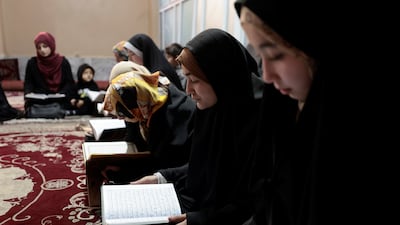Afghan girls and young women are enrolling at madrassas in an effort to continue their education, after the Taliban banned them from attending secondary school.
But experts say these religious schools, while important, cannot compensate for loss of access to secondary education.
A report this year by UN education agency Unesco said that 2.5 million Afghan girls and young women are not in the education system – 80 per cent of the age group.
This includes 1.2 million denied access to secondary schools and universities by the Taliban, after the militant group seized power in August 2021. Women aged over 20 were added to the university ban at the end of 2022.
To keep learning, Afghan girls are looking to religious schools, where the Taliban allows girls above Grade 6 – aged 11 to12 – to study.
“I joined this madrassa a month ago. It's close to my house,” Munira, 16, a student in Kabul, told The National.
“I am happy to be able to learn reading Quran and some religious topics. But I wanted to become a doctor.”
Munira said she was still shocked that her secondary school closed two years ago.
“For the first time in my life, I was not able to go to school. I never thought this would happen to us. Thinking about it makes me feel weak and helpless.”
Afghanistan’s Ministry of Education says more than 20,000 older girls are studying at government-run madrassas.
In total, almost 95,000 girls and young women are studying in these religious schools – including girls below Grade 6.
In addition to government madrassas, private religious schools are also accepting a large number of girls.
Sajeda Baqi, a 43-year-old former religious studies lecturer, had been forced to stay at home after universities were closed for girls.
She now runs Darussalam private religious school in Kabul.
“I started this madrassa three months ago,” Ms Baqi told The National.
“We have more than 50 girl students so far, some of whom are older girls who cannot go to public school because of the ban on girls’ education.
“Every day, we accept new female students.”
“It's a very good opportunity for girls as they currently can't go to school. They will learn their religion and we offer them different social and cultural programmes.”
Zuhra Faizi, an Afghan-American education researcher and a Harvard postdoctoral fellow, says that although religious schools offer some teaching for girls and women, they cannot replace public schools.

“Madrassas might provide many girls an opportunity to continue engaging in a learning space, however in the current form, they do not replace schools which pave the path to future opportunities,” Ms Faizi told The National.
“The Taliban, like all past Afghan governments, will make modifications in the education system. However, they cannot continue to delay the reopening of schools.”
But Ms Faizi also noted that improved security under the Taliban has enabled madrassas for girls and women to open in rural areas, where previously there had been limited access to education under the US-backed Afghan government.
“I met mothers who attend madrassa with their children. They were excited to attend school for the first time in their lives and learn to read the Quran, as well as basic literacy in Dari and Pashto,” she said.
However, girls in major cities and other urban areas feel more restricted, said Ms Faizi.
“Girls in urban areas were accustomed to access to a plethora of educational opportunities, including public schools and courses. Hence, while they might appreciate attending madrassas, there’s still an overall experience of restriction of opportunities,” she said.
While the Taliban believes religious studies are mandatory for both men and women, they view school education as optional.
Despite some support for reopening girls’ education within the Taliban ranks and calls from Afghans, as well as continued pressure from the West, Afghanistan remains the only Muslim-majority country where girls are banned from schools.
The Taliban says it is working on “guidelines” for girls’ education, but there has been no sign of progress.

In March 2022, many female students excitedly rushed to their schools as the Taliban announced the reopening of girls’ education.
However, shortly afterwards, they were sent home.
Afghanistan has one of the world's lowest literacy rates, according to Unesco. Restrictions on girls’ education will significantly impact the country's future, experts warn.
Saeeda Wafa, 36, a graduate of Islamic studies from Kabul says getting an education is a fundamental right of both men and women.
“Islam's instructions in relation to education doesn't exclude women. The history of Islam is full of women scholars. Uneducated women could mean illiterate families and a backward nation,” Ms Wafa told The National.
In the meantime, Afghanistan's girls try to continue their education as best they can.
“All I want is to be able to go back to school and meet my friends and teachers,” said Munira.
“I cry every time I think about my classmates. I've already forgotten most of my studies.”


